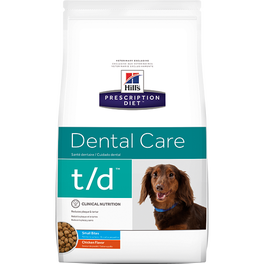Dental health

Helping your pet to maintain good dental hygiene can provide a range of health benefits as well as making life more enjoyable for everyone. Let’s face it – no one likes kitty smooches or slobbery dog kisses involving a nasty smelling mouth. Like us, our pet’s teeth will gradually build up a layer of tartar over time which can harbour bacteria and cause painful teeth and gums. The following are the recommendations for dental care to keep your pet healthy and happy.
Brushing is the ideal way to remove sticky plaque and slow down the build-up of hard tartar. Most pets can be trained to have their teeth brushed, some more easily than your average 2 year old! Use a pet finger-brush or a soft baby tooth brush and train with treats to encourage your pet to allow you to gently touch their teeth. If you would like a free brushing tutorial, ask one of our vets or nurses next time you are in.
Dry food of of some varieties can help to reduce plaque formation. The foods that are recommended are on the Veterinary Oral Health Council (VOHC) list and have been independently assessed to do what they say they do.
Bones are commonly thought to clean teeth and unfortunately this myth has become part of popular culture, despite absolutely no research to back it up. When you think about it, how can chewing on a bone possibly clean teeth? If you or I went to our dentist and said we had decided not to brush and floss our teeth and instead were relying on bones (or even apples) to keep our teeth clean, imagine what our dentist would say. There are much safer and more effective ways to keep your pet's mouth healthy.
Water additives such as Healthy Mouth can assist with preventative dental care, in a similar way to a mouth wash. These are particularly useful just after a clean under anaesthesia and if brushing is not possible for your pet. Most pets love the taste of Healthy Mouth and it comes in a variety of flavours for both dogs and cats.
Dental scale and polish treatments are also necessary to keep your pet's pearly whites healthy and their breath smelling fresh. Most pets need a good thorough clean every 6-12 months, just like we do. The safest and least scary way to do this is under a short anaesthetic, which also allows us to thoroughly check those hidden molars right at the back of the mouth. Anaesthesia, using the most modern of techniques and state of the art monitoring equipment is extremely safe and certainly preferable to having a mouth full of smelly, painful teeth.
Complimentary dental checks are a part of the service we offer at Belconnen Animal Hospital. If you would like some advice on the condition of your pet’s teeth and what you can do to keep them healthy, call us to make a free appointment with one of our qualified nurses.
Brushing is the ideal way to remove sticky plaque and slow down the build-up of hard tartar. Most pets can be trained to have their teeth brushed, some more easily than your average 2 year old! Use a pet finger-brush or a soft baby tooth brush and train with treats to encourage your pet to allow you to gently touch their teeth. If you would like a free brushing tutorial, ask one of our vets or nurses next time you are in.
Dry food of of some varieties can help to reduce plaque formation. The foods that are recommended are on the Veterinary Oral Health Council (VOHC) list and have been independently assessed to do what they say they do.
Bones are commonly thought to clean teeth and unfortunately this myth has become part of popular culture, despite absolutely no research to back it up. When you think about it, how can chewing on a bone possibly clean teeth? If you or I went to our dentist and said we had decided not to brush and floss our teeth and instead were relying on bones (or even apples) to keep our teeth clean, imagine what our dentist would say. There are much safer and more effective ways to keep your pet's mouth healthy.
Water additives such as Healthy Mouth can assist with preventative dental care, in a similar way to a mouth wash. These are particularly useful just after a clean under anaesthesia and if brushing is not possible for your pet. Most pets love the taste of Healthy Mouth and it comes in a variety of flavours for both dogs and cats.
Dental scale and polish treatments are also necessary to keep your pet's pearly whites healthy and their breath smelling fresh. Most pets need a good thorough clean every 6-12 months, just like we do. The safest and least scary way to do this is under a short anaesthetic, which also allows us to thoroughly check those hidden molars right at the back of the mouth. Anaesthesia, using the most modern of techniques and state of the art monitoring equipment is extremely safe and certainly preferable to having a mouth full of smelly, painful teeth.
Complimentary dental checks are a part of the service we offer at Belconnen Animal Hospital. If you would like some advice on the condition of your pet’s teeth and what you can do to keep them healthy, call us to make a free appointment with one of our qualified nurses.
